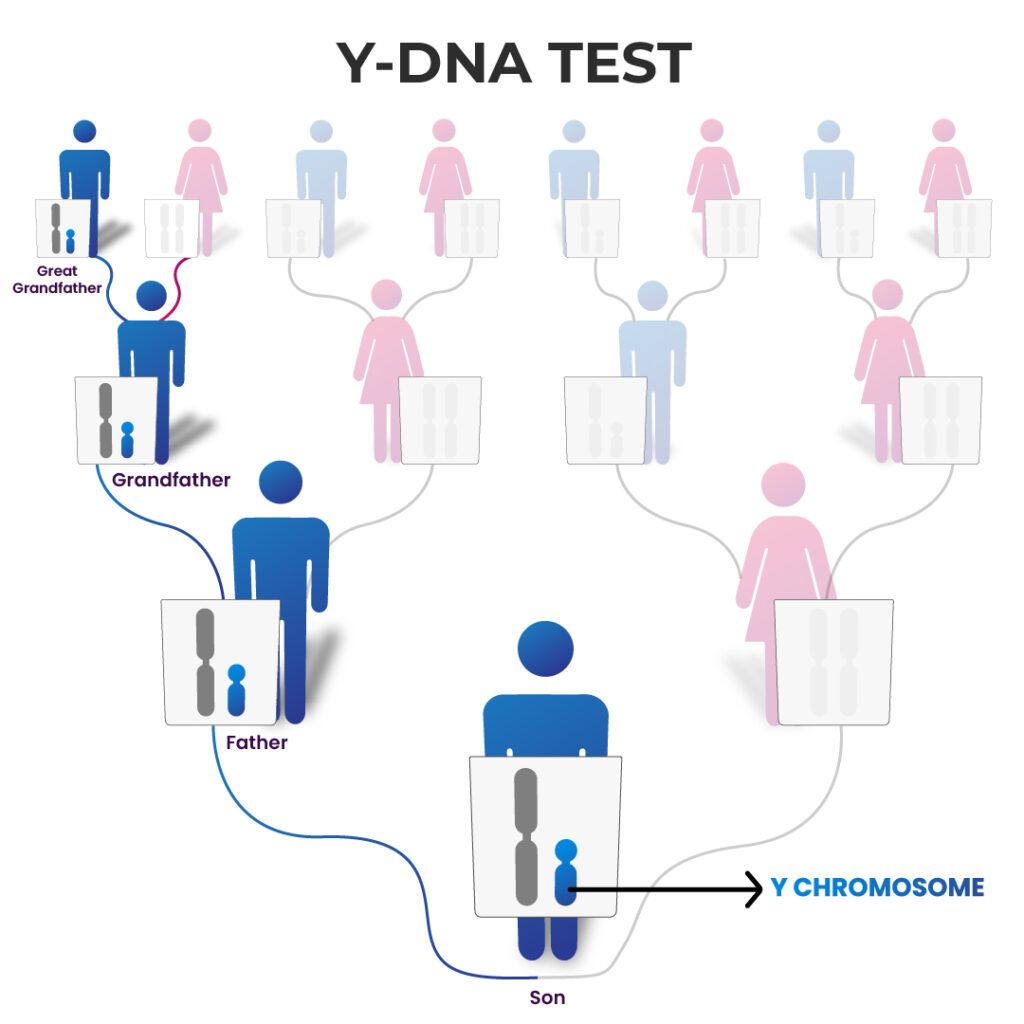DNA tests have a significant role in forensics for many unsolved legal cases.
Autosomal DNA tests are popular for determining parent/child relationships with a high level of accuracy. It looks at maternal and paternal data.
On the other hand, Y DNA tests look at only paternal data, which is helpful in genealogical research.
Already Taken A DNA Ancestry Test? Get 3000+ Insights From Your Raw Data.
What Is Y DNA?
Humans carry 23 pairs of chromosomes in each cell; 22 pairs are autosomes, and one pair is an allosome.
Autosomes are numbered chromosomes like chromosome 1, chromosome 2, etc.
Allosome is a sex chromosome that can be either XX (assigned female at birth) or XY (assigned male at birth).
Y DNA is one of the male sex chromosomes inherited from the father and another chromosome (X) from the mother.
Y DNA is inherited only from the biological father.
Y DNA possesses the SRY gene that produces the protein sex-determining region of the Y-chromosome.
This protein is involved in male-typical sex development.
The structure of the Y chromosome is a block of non-recombining DNA (heterozygous state) transmitted solely through males.
It will be the same for grandfathers, great-grandfathers, and forefathers of ancestry if the paternal lineage is unbroken with a female child.
Mutations in the Y DNA occur rarely, and consistent inheritance is helpful in chromosome DNA testing.
Importance of Y DNA
Y DNA is the major sex-determining chromosome in people assigned male at birth.
It is responsible for the development of the male reproductive system.
Y DNA is vital to trace the paternal lineage back hundreds or even thousands of years of ancestry (family tree).
Y DNA is a genealogical DNA, inherited unchanged from father to son, which will determine the direct father-line ancestry.
Y DNA reveals deep geographic origins and genetic relationships.
Y DNA is effective in archaeology, which shows the human occupation of the Americas before the development of the Clovis lithic culture.
Evidence from the Y chromosome points to the advent of humans in the Americas between 10 to 20,000 years ago.
Y DNA is a non-recombining DNA and has a low mutation rate, making it easy to find the common ancestor with your paternal line.
Y DNA Test
What Is It?
Y DNA test is a male-specific genealogical DNA test used to determine the paternal lineage of biological males.
There are two kinds of Y-DNA tests, the Y-DNA STR test and the Y-DNA SNP test, which have different purposes in DNA testing.
Short Tandem Repeats (STRs) are small repetitive DNA sequences that account for ~3% of the whole human genome.
In Y-DNA STR tests, STR makers on the Y chromosome measure the number of times the DNA sequences are repeated.
Though Y-DNA STR tests are variable and mutative, it establishes the timeframe when two men share a common paternal ancestor.
Unlike Y-DNA STR markers, Y-DNA SNP markers are stable over many generations.
Single Nucleotide Polymorphism (SNP) is a genetic change that occurs at a single specific position in the genome.
An SNP mutation is carried indefinitely by descendants of the individual in whom the SNP had formed – the SNP Progenitor.
Y-DNA SNP tests detect the mutations/ variations and distinguish one genetic lineage from the other.
SNP testing, such as the Big Y-700 test, gives information on haplotree (genetic family tree) and time to the most recent common ancestor (TMRCA).

Image: Y-DNA Test
How To Take?
Y DNA tests can be taken at home like many other DNA tests.
- The Y DNA test kit can be ordered online.
- The kit contains all the necessary instructions on how to use it.
- The sample is collected by cheek (buccal) swab sticks and sealed in a given envelope.
- The buccal cells contain the DNA, which provides genetic information.
- The sealed sample is shipped back to the lab, and the results are obtained via mail.
- Salivary samples may also be used here.
Who Can Take It?
Only males can take the Y DNA test for insights about their biological father’s lineage.
The best way to choose the right test taker is to pick the person from a family tree with only sons and no daughters.
The man descending from that ancestor would have inherited the Y chromosome DNA through several generations.
Why Take It?
You can take up the test if you are a male who wants to
- Discover ancient population groups from which a patrilineage descends
- Trace genetic genealogy and locate long-distant ancestors
- Find migrated ancestors and their geographical origins using Y DNA databases
- Distinguish between different clans of the same surname, living in the same area
What To Expect?
Here are some possible results and interpretations you can expect from the Y DNA test.
The test compares the 12-marker results of one person to the 12-marker results of another person with the same surname.
- If the results are 12/12, there is a 99% chance that the two are closer to the time specified by the TMRCA tables.
- If the results are 11/12, there is still a chance of being related with the same surname.
- The 25-marker results of individuals with a score of 25/25 are relatively closer than the 12-marker results.
- If the score matches for individuals of a different surname, they are not recently related.
Recently related means a time frame of about 1000 years or 40 generations.
Can Females Take Y DNA Test?
Females cannot take the Y DNA test since they don’t inherit Y chromosome DNA.
If females wish to take the Y DNA test, they can opt for their brother, father, paternal uncle, or paternal grandfather as test takers.
Which Y DNA Test Should You Take?
A Y-DNA STR test is ideal for establishing whether alleged male relatives are biologically related.
The Big Y-700 test is most useful when you have traditional Y DNA testing with good match scores going back at least eight generations.
Summary
- Y DNA test determines the paternal lineage or direct father-line ancestry of males.
- There are two kinds of Y-DNA tests, the Y-DNA STR test, and the Y-DNA SNP test.
- The Y-DNA STR test is ideal for establishing whether alleged male relatives are biologically related.
- Y DNA SNP tests, such as the Big Y-700 test, give information on the genetic family tree.
- Only males can take the Y DNA test, and females cannot since they don't inherit the Y chromosome DNA.
- Y DNA test can be taken at home using salivary samples or buccal (cheek) swabs.






